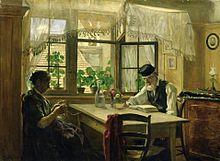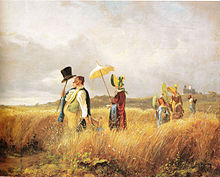Sunday rest


Sunday rest is the legally protected rest on a generally non-working Sunday .
Situation in Germany
historical development
In premodern Christian societies, the Sunday rest meant that on Sunday servitude was reduced to a minimum for religious reasons; The real purpose of the Sunday sanctification was to attend church services. Emperor Constantine the Great (306–337) played a key role in strengthening Christianity in terms of religious policy . He was the first to introduce the Sunday rest through a state law after Sunday had already been highly valued as the day of the resurrection in apostolic times.
According to the Mosaic Laws, the Sabbath must be celebrated as God's day. In order to distance themselves from Judaism , Emperor Constantine and Pope Silvester I jointly determined Sunday as the Christian day of rest after the First Council of Nicaea (325) and rejected the Sabbath. Within the Roman Catholic Church , the Sunday commandment applies to Sunday , which requires all believers from the age of 7 to attend the Sunday Holy Mass .
In the course of the 19th century , the order of the day that protected Sunday as a day of rest broke. Sunday became increasingly a working day, especially in the second half of the century. The state then began to limit Sunday work as part of social policy legislation.
This initially applied to the trade. The trade regulation amendment of June 1, 1891, issued by Kaiser Wilhelm II , resulted in a general ban, the provisions of which relating to Sunday work came into force on July 1, 1892. However, numerous trades remained exempt from the ban. Sunday work in stores in open sales outlets was limited to five hours, but there were extensive exceptions for the fresh food trade.
Sunday rest is stipulated in the nationwide Working Hours Act and in state laws, whereby a general prohibition of employment is binding with a few exceptions. Due to the Reich Concordat, disruptive events are also prohibited on Sundays and public holidays during the main time of the service.
As far as the Sunday rest is a matter of the state with regard to the public holiday legislation , there are different regulations. For example, video stores are allowed to open on Sundays in some federal states , but not in others. In Baden-Wuerttemberg also vending machine video libraries have to be closed, since customers also trigger a "workday hustle and bustle" because renting videos - as opposed to watching videos - is a "typical working day life process".
The Sunday rest has a current reference with the amendment of the shop closing laws in the individual federal states in the course of the federalism reform . Since the 1980s, this situation of the previous store closing law has been questioned primarily by the FDP , parts of the CDU / CSU and large retail companies. The result was a softening of the Sunday rest.
Sunday rest is constitutionally protected. Art. 139 of the Weimar Imperial Constitution of August 11, 1919, which is part of the Basic Law in accordance with Art. 140 GG , stipulates that Sunday is legally protected as the day of rest from work and spiritual elevation. An abolition or a regulation that fundamentally calls into question the Sunday in this function is therefore not compatible with the Basic Law and therefore eludes a fundamental new regulation by the state parliaments.
According to a GfK survey from 2014, almost a third of the German population would agree to a complete lifting of the sales ban on Sundays, while 63 percent are already using the offers for Sunday shopping or shopping in neighboring countries on Sundays.
Statutory regulations and judicial law
According to Section 9 (1) ArbZG, the rule applies that no employees may be employed on Sundays and public holidays between midnight and midnight . These times can be postponed by six hours for shift workers and two hours for drivers. There are numerous exceptions to this rule in Section 10 of the ArbZG, and employees may be employed in the following situations, services and locations:
- Emergency and rescue services as well as fire brigade
- Maintaining public safety and order as well as the functionality of courts and authorities and for defense purposes
- Hospitals and other facilities for the treatment, care and care of individuals
- Restaurants and other establishments for hospitality and accommodation as well as in the household
- Music performances, theater performances , film screenings , exhibitions of , shows and other similar events
- Non-commercial actions and events of churches, religious societies, associations, clubs, parties and other similar associations
- Sports events and leisure, recreation and amusement facilities, in tourism as well as in museums and scientific reference libraries
- Broadcasting companies , in the daily and sports press, in news agencies and in daily activities for other press products including delivery, in the production of typesetting, films and printing forms for daily news and images, in daily recordings on sound and image carriers as well as in Transport and order picking of press products that are first published on a Monday or the day after a public holiday
- Trade fairs , exhibitions and markets within the meaning of Title IV of the trade regulations and at public festivals
- Transport companies as well as during the transport and picking of perishable goods within the meaning of Section 30 Paragraph 3 No. 2 of the Road Traffic Regulations
- Energy and water supply plants and waste and sewage disposal plants
- Agriculture and animal husbandry and facilities for the treatment and care of animals
- Guarding trade and in the guarding of industrial facilities
- Cleaning and maintenance of operating facilities, insofar as this requires the regular progress of one's own operation or that of a third-party operation, in preparation for the resumption of full working day operations and in maintaining the functionality of data networks and computer systems
- Prevention of the spoilage of natural products or raw materials or the failure of work results as well as continuous research work
- Avoidance of destruction or significant damage to production facilities
In addition, there are special regulations, for example for working in bakeries and pastry shops or for carrying out urgent payment transactions in securities trading .
In Germany, the Working Hours Act (Section 13, Paragraph 2) authorizes the federal states to approve further exceptions (in addition to the exceptions set nationwide). However, the Federal Administrative Court (BVerwG) has declared the Hessian Consumer Trade Ordinance to be ineffective insofar as it allows employees to be employed on Sundays and public holidays in the areas of video stores and public libraries, call centers and lottery and toto companies. The employment of workers in these areas is not necessary to meet the particularly emerging needs of the population on these days for leisure activities. On May 6, 2020, the Federal Administrative Court ruled that the Protestant Church in Saxony must be involved in the approval of Sunday work in call centers (Az. BVerwG 8 C 5.19).
See also
literature
- On the seventh day. History of Sunday , Sankt Augustin 2002.
- Uwe Spiekermann: Free consumption and social responsibility. On the history of shop closing in Germany in the 19th and 20th centuries . In: Journal for Company History 49 . 2004, pp. 26-44.
- Ulrike Verch: Go to the library on Sundays! The revival of Library Sunday in Germany . Berlin 2006.
Web links
Individual evidence
- ↑ On the dispute about Sunday rest in the 19th century, cf. Wolfgang Ayaß : Bismarck and worker protection. Otto von Bismarck's rejection of statutory workers' protection - an analysis of the dimensions and background , in: Vierteljahrschrift für Sozial und Wirtschaftsgeschichte 89 (2002), pp. 400–426; see. also the three “worker protection” volumes of the source collection on the history of German social policy from 1867 to 1914 .
- ↑ Ordinance regarding the entry into force of the provisions of the trade regulation amendment of June 1, 1891 , enacted on March 28, 1892. In: Reichsgesetzblatt , Jg. 1892, No. 18 of March 29, 1892, p. 339.
- ^ NRW: Announcement of the new version of the law on Sundays and public holidays. Retrieved December 3, 2017 .
- ↑ NRW: §5 of the law on Sundays and public holidays. Retrieved December 3, 2017 .
- ↑ Jens Witte: Legal dispute over video library - the machine should be idle on the seventh day , Spiegel Online, August 25, 2011
- ↑ Germans want to go shopping on Sunday too , GfK study, Die Welt, December 21, 2014
- ↑ Federal Administrative Court, judgment of November 26, 2014, 6 CN 1.13
- ↑ Press release 69/2014 of the BVerwG
- ↑ Judges forbid the expansion of Sunday work , FAZ.net
- ↑ Federal Administrative Court curbs Sunday work , sueddeutsche.de, November 26, 2014
- ↑ Sunday remains a bit holy , spiegel.de
- ↑ https://www.lto.de/recht/nachrichten/n/bverwg-bverwg8c519-kirche-evangelisch-sachsen-sonntagsarbeit-beteiligung-religionsfreiheit/ Legal Tribune, accessed on May 7, 2020